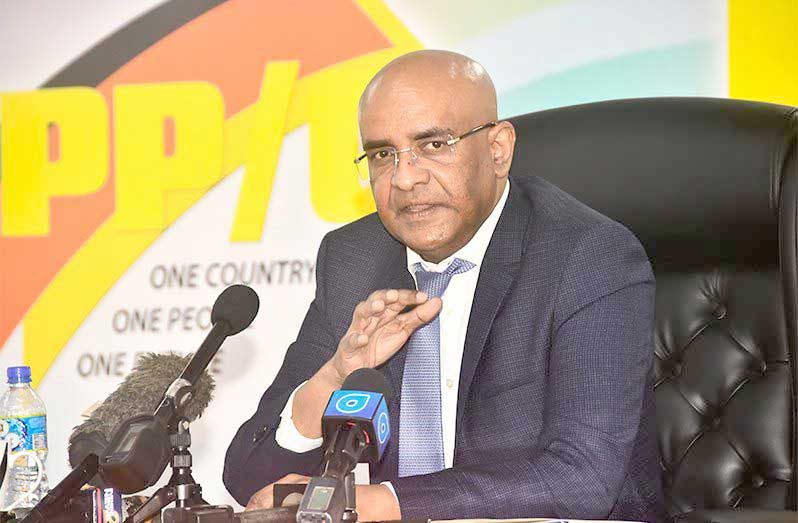–Jagdeo assures citizens; emphasises plans to further enhance disposable income of local households, address cost-of-living issues
MAKING life more comfortable for all and creating even more opportunities for citizens are at the heart of the People’s Progressive Party/Civic’s (PPP/C’s) plan for the next five years in office, as their agenda will focus on keeping essentials affordable while further expanding job creation, housing and social services.
With global prices still elevated because of global conditions, the Government of Guyana has taken real steps to absorb the brunt of these impacts.
In spite of the volatile global energy markets, the government has absorbed significant portions of the costs of fuel, resulting in stable utility rates, among other crucial benefits.
However, Guyanese could expect electricity rates to be slashed even further with the government’s plan to bring the gas-to-energy project on stream.
In Essequibo, the government is already investing in solar plants which will lead to the residents’ rates being cut by 50 per cent.
This was disclosed on Saturday by the People’s Progressive Party/Civic’s (PPP/C’s) General Secretary and Guyana’s Vice President, Dr Bharrat Jagdeo during an election rally in Region Two (Pomeroon-Supenaam).
GETTING FOOD PRICES DOWN
Lowering food prices and boosting food production is also on the agenda for the government’s next term.
Although agriculture has been revitalised, the local concerns about food affordability is ongoing within the national discourse.
Some food prices from field to market are hiked and this is a focus that the government wants to address.
“We hear the concerns of people, but if we put more money in people’s pockets because of better jobs and giving poor families help, and we also help them, those who don’t have a house, to build a house, and we then work at reducing cost and subsidising many of the items, as we have done, then many of those families will get a better life, and that’s what we’re about,” Dr Jagdeo said.
MORE SUPPORT
The government’s strategy involves a combination of interventions to place more money into people’s pockets and support families.
Since assuming office in 2020, the government has spent billions of dollars to reverse the more than 300 taxes that were put in place by the previous government.
Moreover, the ‘Because We Care’ cash grant has been restored.

In fact, this year 205,000 children benefitted from the cash grant, which has been increased to $50,000 coupled with the $5,000 uniform allowance.
In the education sector, there has been much emphasis to provide universal education and digitising learning materials.
The school-feeding programme is another initiative that has become a vital pillar in the nation’s education sector. The community-based programme targets attendance, learning outcomes, and nutritional status.
This programme has produced significant benefits as attendance rose by roughly four per cent, stunting declined in participating schools, and academic scores improved significantly for those receiving meals.
Dr Jagdeo said: “We need better and more jobs for our people across the country, including in this region [Region Two], and I promise you that you will get those jobs here in Region Two. We need to continue taking away cost from our people.
“We put more money in the pockets of many people, the pensioners, the public servants, and that will continue. The pensioners will continue to get better benefits. They will continue to get the free water that APNU took away. The public servants will get increase[s]. Those on public assistance will get increase. There will be cash grants to families.
“We will make sure that you don’t have to pay for your children’s education. We’ve already started that process. The ‘Because We Care’ grant will be increased, every child will get a transportation grant every year, so we’ll assist the parents for them to send them to school; school-feeding programmes for our children, so they can get a nutritious meal.
“We have to get the best health care here; you know that we are building a new hospital and that will provide quality care, so you don’t have to spend your money on health care. You don’t have to spend your money on your children’s education. We will lower electricity price across the country when the gas to energy comes.”
With digital tools, student-centred support systems, and an emphasis on balance and well-being, the education landscape is transforming, and the results are starting to show.
This year, Guyana recorded its best overall performance, with the pass rate moving from 49 per cent in 2024 to 63 per cent in 2025.
Additionally, access to education has become easier for many, especially single parents, full-time workers or those living in far-flung areas with the launch of the Guyana Online Academy of Learning (GOAL).
Since its launch in 2021, more than 30,000 Guyanese have received GOAL scholarships, with over 70 per cent of them being women.
He said: “Whether you’re Amerindian, Indian, Portuguese, or you’re Afro-Guyanese or mixed, we [are] going to push you very hard to be educated, to get the scholarship to study. We’re going to
push you to own a home. We’re going to help you get a job. We’re going to help you start a small business, because we’re establishing a development bank.”


.jpg)











